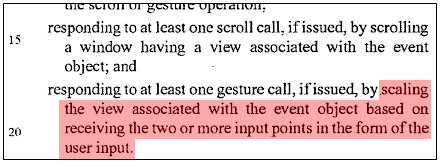Oh hell. Steve Wildstrom says I was right the first time: the pinch-to-zoom feature wasn’t part of the Apple vs. Samsung patent case, and Apple has never asserted exclusive rights to it:
Apple only has a limited patent (US 7,812,826) on the pinch to shrink, stretch to zoom gesture that is a core element of touch interfaces. And the ’826 patent wasn’t in dispute in the Samsung case because Apple never asserted it.
….I’m not sure where the idea that pinch and stretch was at stake originated. It seems to have crept into the trial coverage at some point and become part of the folklore of the case. And when the jury announced that it had found infringement by Samsung on all three utility patents, a large number of writers seemingly assumed that one of those covered the gesture.
I guess you can put me back in the “confused” category again, because Wildstrom is right: everyone else in the world sure seems to think that pinch-to-zoom was part of the jury’s verdict in the case. He and I appear to be the only holdouts.
My original confusion stemmed from the fact that I had actually read through the patents and the jury verdict, and they didn’t seem to match the press reports. I think there are three problems here:
- If you read the entire 381 patent, you’ll find pinch-to-zoom described (p. 17-28 and 55-56). However, if you look at claim 19, which was the only one at issue in the court case, it describes only the “bounce” feature that you see when you scroll a list past its top or bottom. The descriptive stuff may have thrown some
 people off, but it doesn’t really matter. Only the claims matter.
people off, but it doesn’t really matter. Only the claims matter. - However, claim 8 of the 915 patent does make a reference to “scaling the view” if the operating system receives “two or more input points.” That sounds like pinch-to-zoom, but it’s not crystal clear. What’s more, this is strictly a patent on the programming interface, not on the feature itself.
- The jury verdict merely states whether Samsung violated a particular patent claim or not. It doesn’t say specifically which feature of the patent has been upheld. So if Samsung is held to have violated a claim, that might mean that it violated everything in the claim or only one part of the claim.
Put all of this together, and it spells confusion. I’m certainly confused, anyway, and while I honestly didn’t intend for this blog to become pinch-to-zoom central, I guess that’s what it’s become whether I like it or not. I’ll keep you updated if I learn more.
UPDATE: In comments, Trippie offers a possible explanation of the 915 patent:
The “scaling the view” if the operating system receives “two or more input points” part you reference could be the two-finger tap to zoom out. It’s a pretty nice feature that not a lot of people know about. In maps, just as you double tap with one finger to zoom in, you can single tap with two fingers to zoom out. I use it all the time.
In other words, the 915 patent is about tap-to-zoom, not pinch-to-zoom. The 163 patent describes tap-to-zoom as a feature, while the 915 patent describes the programming interface that implements it. Likewise, the 381 patent describes the bounce effect as a feature, while the 915 patent describes the implementation. This sounds like the right explanation to me.

















